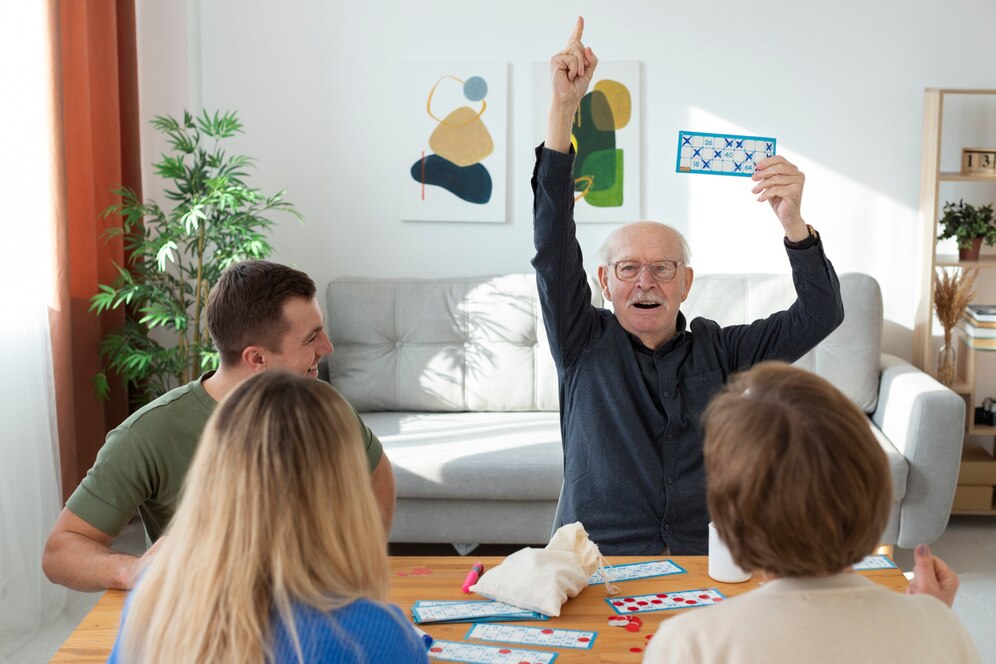When a loved one is living with dementia or Alzheimer’s, every moment of connection and comfort matters. Memory care facilities offer many fun activities and therapies to help people with memory issues improve brain health. These facilities not only provide medical oversight for seniors, but also provide a safe living environment.
Why are Activities Important in Memory Care?
Engaging in physical and mental stimulating activities in memory care facilities boosts brain function, encourages social connections, and emotionally supports residents and their caregivers. Below are some of the primary benefits:
- Improved Brain Health – Activities like puzzles, word games, and telling stories help keep the mind sharp and slow down mental decline.
- Enhanced Physical Health – Easy exercises like walking groups and chair yoga make people more mobile, stronger, and healthier overall.
- Feeling Supported – Getting together for group activities and talking about old times create a sense of fitting in and reduces loneliness.
- Better Behavior and Mood – Taking part in meaningful activities like meditation and therapies can lessen restlessness, worry, and improve overall mood.
Types of Activities in Memory Care
Memory care facilities provide a variety of activities to improve the overall health of residents. When your loved ones participate in these fun and meaningful activities, they become engaged and it promotes an overall pleasant environment. Some activities offered include:
Mind Stimulation Activities
Games like Bingo, Chutes & Ladders, and crossword puzzles stimulate a person’s memory and problem-solving skills. These activities help to keep the brain and mind active. Sharing stories and joining book groups spark interaction and assist people in remembering past events.
Activities That Get You Moving
Exercises like aerobics, Yoga, dancing, walking, etc. help seniors improve flexibility and balance. Some memory care facilities arrange group walking or dancing sessions which helps promote movement and interactions with peers.
Therapies That Bring Out Creativity
Therapies like music therapy, art therapy, dance therapy, etc., are very effective for improving overall wellbeing. For example, painting can uncover emotions and listening to nostalgic music can refresh the mind. These activities lower stress, stimulates memory, and improves mental health.
Activities That Are Social And Fun
Fun activities like group discussions, pet therapy, and gardening give residents a sense of purpose and provide happiness. Cooking classes and interactive events encourage residents to be involved.
Sensory Stimulation Activities
Sensory exercises help loved ones reminisce and reduce anxiety. These activities may include aromatherapy and touch therapy which utilizes objects with different textures. Sensory objects often spark memories. By encouraging relaxation, walking and spending time in sensory gardens, this helps residents connect with their environment.
Role of Therapies in Memory Care
Memory care facilities focus on boosting brain function, mental health, and general wellness. Some of the most valuable treatments include:
Music Therapy
Entertainment and music therapy play a vital role as songs bring back memories. According to the Journal of Alzheimer’s Disease, music interventions led to a notable decrease in anxiety levels among 60% of dementia patients. Listening to music will affect different parts of the brain, making it a positive activity in memory care. It can also be a source of comfort and familiarity, helping to lower stress and calm residents. Singing together builds social bonds and helps improve communication.
Pet Therapy
Pet therapy is beneficial because interactions with animals also helps reduce stress. Playing with animals can provide joy and usually improves the overall mood of the person involved. Pet therapy encourages social interaction, communication, and we often see an expression of emotions.
Reminiscence Therapy
Photos, objects, and music from someone’s past can spark memories and emotional ties. Familiar items often bring up strong feelings which can lead to pleasant conversations and memories. This activity provides the opportunity for caregivers to create important connections with your loved one.
Aromatherapy
For managing anxiety and sleeping issues, essential oils like lavender are useful. Aromatherapy sessions promote a relaxing atmosphere and can enhance overall wellness. The comforting smells can improve sleep habits and boost emotional health, making them very common in memory care facilities.
Enhancing Activities and Therapies in Memory Care
To experience the benefits of activities and therapies in memory care facilities, personalized programs should be created including:
- Structured Routines: Following the same routine reduces the chance of confusion and provides comfort for those with dementias.
- Caregiver Involvement: Training caregivers to lead activities and therapies allows them to be incorporated throughout the day.
- Technology Integration: Utilizing interactive screens, virtual reality, and music players help in drawing attention and makes these activities a pleasurable experience.
In Conclusion
For seniors living with dementia, memory care communities provide much more than just a safe environment. They provide thoughtful, meaningful support through activities and therapies designed to nourish the mind, body, and spirit. These programs include everything from cognitive exercises and gentle movement to social events and sensory-based therapies.
Memory care providers put so much heart into creating routines that are not only comforting but also uplifting. It’s about making each day feel purposeful and full of small, joyful moments for your loved ones. Contact Village at Valley View for better memory care facilities and to know more about their activities and therapies offered.



